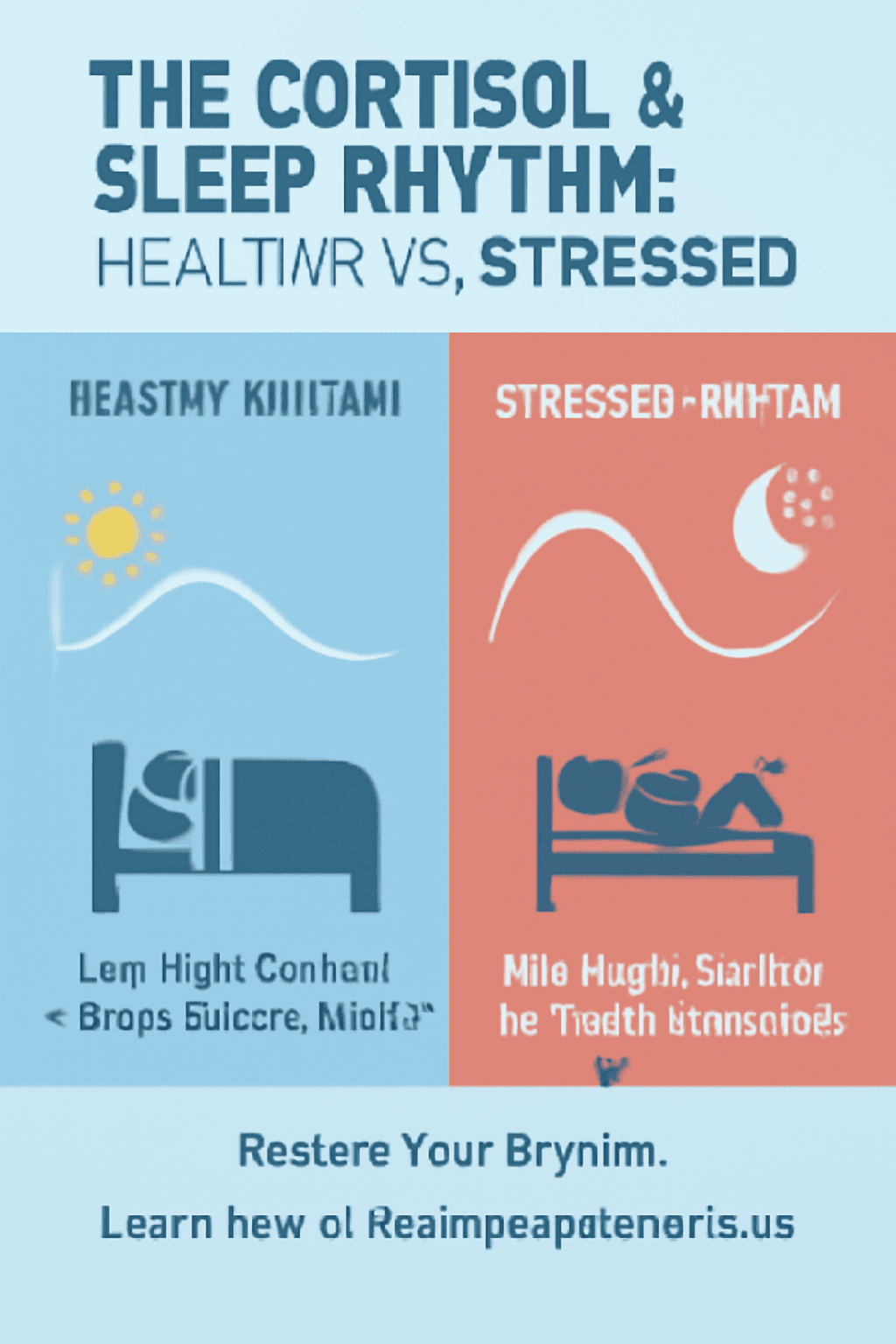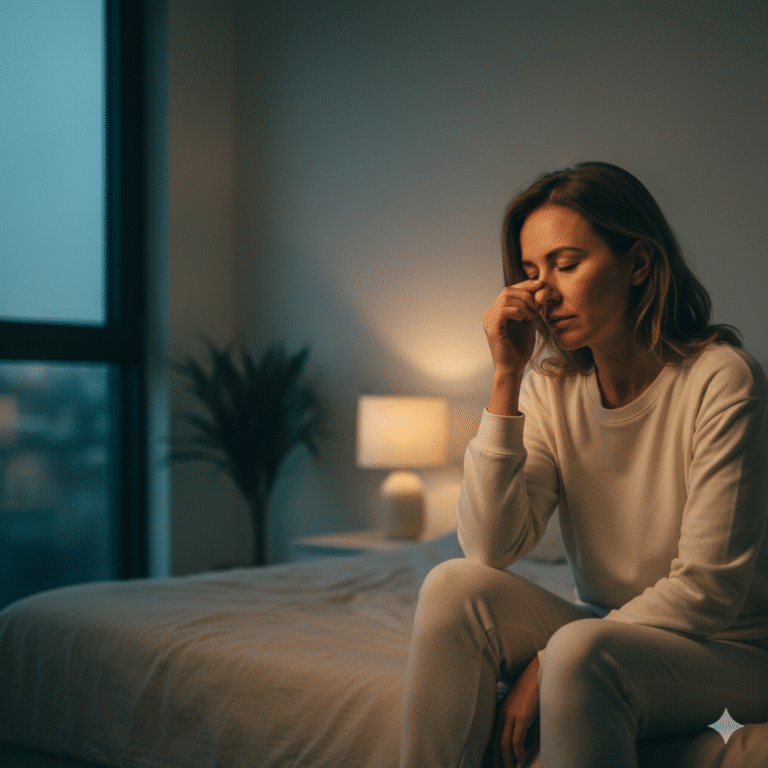
Educational split-screen infographic comparing how cortisol and sleep patterns differ between healthy and stressed states—showing the impact on sleep quality.

Cortisol and Sleep: How Stress Hormones Affect Rest
Key Takeaways
- Your body has a natural **cortisol and sleep** rhythm: cortisol should be high in the morning (to wake you up ) and low at night (to let you sleep).
- Chronic stress flips this rhythm, leading to high cortisol at night when it should be low.
- This hormonal imbalance is a primary cause of difficulty falling asleep, waking up in the middle of the night, and non-restorative sleep.
- High nighttime cortisol keeps your brain in a state of alertness, preventing the deep, restful sleep necessary for recovery.
- You can take active steps to reset your **cortisol and sleep** cycle through lifestyle changes and targeted support.
Inside This Sleep Guide
Introduction: The Hormone That’s Sabotaging Your Sleep
>>Do you ever lie in bed, exhausted, yet your mind is racing? Or do you wake up like clockwork at 3 AM, wide awake and unable to fall back asleep? You might blame a busy day or a racing mind, but the real culprit is often hormonal. There’s a powerful connection between **cortisol and sleep**, and when it’s out of balance, your nights are the first casualty.<<<
Understanding this link is the first step to reclaiming your rest. Cortisol, your body’s primary stress hormone, isn’t inherently bad. In fact, as we learned in our guide on what cortisol is, it’s essential for life. The problem arises when its natural rhythm is thrown off by the demands of modern life and chronic stress. The relationship between **cortisol and sleep** is delicate and easily disturbed.
The Natural Rhythm: How Cortisol and Sleep Should Work
Imagine your cortisol levels as a wave throughout the day. This is your circadian rhythm, the master clock governing the **cortisol and sleep** cycle:
- Morning (Peak ): Cortisol levels naturally peak around 8 AM. This is your body’s “wake-up call,” giving you the energy and alertness to start your day.
- Afternoon (Decline): Throughout the day, cortisol levels gradually decline.
- Night (Trough): Cortisol should reach its lowest point around midnight. This drop signals to your body that it’s time to produce melatonin, the sleep hormone, allowing you to fall asleep and stay asleep.
This elegant dance between **cortisol and sleep** is fundamental to your health. When it works, you feel energized during the day and sleepy at night. A healthy **cortisol and sleep** pattern is the foundation of good health.
See How Stress Wrecks Your Rhythm
This 30-second video shows how quickly stress can throw your system out of balance.
5 Ways Chronic Stress Disrupts Your Sleep Cycle
When you’re under constant stress, your body doesn’t get the “all-clear” signal to lower cortisol at night. This leads to a dysregulated rhythm that wrecks your **cortisol and sleep** balance in several ways:
- Difficulty Falling Asleep: High cortisol at bedtime acts like a shot of espresso. It keeps your nervous system in “fight-or-flight” mode, making it nearly impossible for your mind to quiet down and drift off.
- Frequent Nighttime Waking (Especially 2-4 AM ): Your body’s natural cortisol cycle has a small pulse in the early morning hours to prepare for waking. If your baseline cortisol is already too high, this small pulse becomes a huge surge, jolting you awake in the middle of the night.
- Suppressed Melatonin Production: Cortisol and melatonin have an inverse relationship. When cortisol is high, melatonin production is suppressed. Without adequate melatonin, you can’t achieve deep, restorative sleep. This is a core issue in the **cortisol and sleep** problem.
- Reduced Deep and REM Sleep: Even if you manage to stay in bed for 8 hours, high cortisol prevents you from spending enough time in the most crucial sleep stages (Deep and REM), where physical repair and memory consolidation happen. You wake up feeling like you haven’t slept at all.
- Increased Blood Sugar at Night: Cortisol signals your liver to release glucose for energy. High levels at night can lead to blood sugar fluctuations that may also contribute to waking you up, further disrupting the **cortisol and sleep** connection.
How to Reclaim Your Nights: Resetting Your Cortisol Clock
The good news is that you are not powerless. You can actively work to restore the natural harmony between **cortisol and sleep**.
- Create a “Power-Down” Hour: The hour before bed is sacred. No screens (the blue light mimics daylight and disrupts melatonin), no stressful conversations, and no work. Read a book, listen to calming music, or take a warm bath.
- Mind Your Light Exposure: Get bright sunlight in the morning to reinforce your “wake-up” cortisol peak. Keep your bedroom as dark as possible at night to support melatonin.
- Eat for Stability: Avoid large, sugary meals or excessive alcohol close to bedtime, as they can disrupt your hormonal balance and affect the **cortisol and sleep** relationship.
The Smart Solution for a Restful Night
For many, lifestyle changes alone aren’t enough to break the cycle of stress and poor sleep. This is where adaptogens can play a key role. A high-quality formula like **CortiSync** is designed to help your body’s stress-response system re-establish a healthy rhythm. By supporting the adrenal glands and promoting a balanced cortisol curve, it can help lower those disruptive nighttime levels, allowing your body to finally get the deep, restorative **cortisol and sleep** balance it desperately needs.
Includes a 67-Day Money-Back Guarantee
Alternative for Stimulant-Free Support
If your primary goals include both stress management and weight support without stimulants, **CalmLean** is an excellent complementary option. Its formula is designed to promote a state of calm, which can also contribute to a better night’s sleep.
Frequently Asked Questions
Why is my cortisol high at night?
High cortisol at night is usually due to a disrupted circadian rhythm, often caused by chronic stress, late-night screen time (blue light ), or late-night eating. This keeps your body in ‘daytime mode’ when it should be powering down for sleep.
What are the symptoms of high cortisol at night?
Symptoms include difficulty falling asleep (racing thoughts), waking up frequently between 2-4 AM, and feeling ‘wired but tired’ at bedtime. You might also wake up feeling unrefreshed, even after a full night in bed.
How can I lower my cortisol to sleep better?
You can lower cortisol for sleep by creating a consistent bedtime routine, avoiding screens an hour before bed, practicing relaxation techniques like deep breathing, and ensuring your bedroom is dark and cool. Supporting your body’s stress response with adaptogens can also help regulate your cortisol rhythm.
These statements have not been evaluated by the Food and Drug Administration. This product is not intended to diagnose, treat, cure, or prevent any disease. Results may vary. Always consult with a healthcare professional before starting any new supplement regimen.
Last reviewed: July 2025









